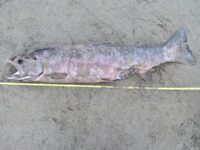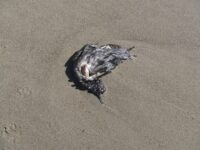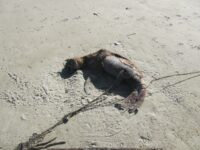Mile 94 Report
West of Laurel Lake, Lost Lake
November 23, 2013
More people than we have ever seen on a beach walk before, two fishermen in small powered boat on new River, one fisherman walking, and what appeared to be a family of three walking South along the West Bank of the New River.
Report Details
More people than we have ever seen on a beach walk before, two fishermen in small powered boat on new River, one fisherman walking, and what appeared to be a family of three walking South along the West Bank of the New River. Weather very mild. Small dark ducks on Lower Fourmile Creek and New River. Three or four sea gulls. What we think might have been one lone and then a flock of Western Snowy Plovers.
Conditions
Temperature: 65 F. Cloud Cover: Sunny. Wind Velocity: Calm/Light. Wind Direction: W.
Human Activities
Number of people: 8. Number of dogs: 1. Walking or running: 6. Photography: 1. Fishing: 3. Two fishermen in motor boat on New River, one fisherman walking North on beach, group of three people walking South along West Bank of New River, and the two of us and our dog walking from Lower Fourmile Creek to mouth of New River and back.At 1:05 pm we set out with Lucie Anne. It was very mild, warm sunny and with no clouds. The breeze was very light. We walked down the newly mown path, courtesy of Tom Brown, to our dinghy, the Second Sea Sprite. Things were a bit disorderly. The large knotted climbing robe Rick Tempesta had attached to the myrtle tree was untied from the tree and in a pile near its base. I guessed that Tom had done that to avoid chopping it up with his track-powered mower.We tied that rope, which helps us climb back up onto the land until I build us a dock, to the tree again and got the boat launched. Lucie got in first and then Blaine and finally me. I rowed us out onto the Lower Fourmile Creek, which was as calm as we have ever seen it. The weather was warm enough that a tee shirt and shorts were quite sufficient, and there was scarcely a breeze; so, the water was a mirror, both on the Creek and the River. We saw many small ducks on both bodies of water, and some took flight as we passed by. We found a good spot to pull up on the West shore of the New River, and all got out. I left my sweatshirt on the boat as it was so warm and mild.We were surprised to see a motor boat making its way towards us from the South. It carried two fishermen. When I mentioned that technically there were not supposed to be motor craft in the new River, one of them said the rules had changed according to a sign where they put in at Storm Ranch.(Rick Howard, the noted local fishing guide, had told us earlier that the BLM does not really control the New River and that control belongs to the State, which he said does permit motor craft.) We crossed the dunes and agreed they are even wider than in the past, and it appeared there was even more European Beachgrass. The sandy beach was also unusually wide, over a hundred yards from the west edge of the foredune to the surf,and it was very level with a slope just at the edge above the surf. Although at the far north end of our walk, up near the mouth of the New River, the sloped portion of the sand became wider. The beach was very clean with hardly any objects on the sand. There were some clumps of dry bull kelp here and there but otherwise pretty much nothing on the dry sand. The waves were as small as I can recall seeing, just three feet from trough to crest on the largest and most only about two feet tall. Perhaps consequently, the spindrift was minimal, and so, the view both north toward Bandon and south to Cape Blanco was the clearest I can remember.We saw a single small white and grey bird and wondered if it was a Snowy Plover. I took a photo. Further along we saw a flock of what appeared to be the same birds, twenty or more. I photographed them, too. I tried to capture them in flight but was unable to do so. We also saw several large gulls, each solitary, two or three in the water and one on the sand. Before we had walked past what I think is the end of mile 94 two twin engine airplanes flew overhead, crossing from west to east. Blaine speculated they were heading for the little Bandon Airport, perhaps to play golf over the holiday weekend. As near as I could tell they both had retractable landing gear. Fancy. We made our way north across miles 94 and 95 (and probably the first part of 96). We started out about 1:30 pm. We didn’t reach the place where the new River now reaches the sea until we had walked about an hour and a half. I imagine we were walking two miles an hour so that would place it two and a half miles at least north of the mouth of the Lower Fourmile Creek. It keeps moving north. Blaine pointed out that the Twomile Creek now enters the New River hundreds of yards south of where the New River reaches the sea. The confluence of the two used to be directly west of where the New River met the sea. As we made our way north there were small pebbles, not larger than a golf ball, but of many many diverse colours in the wet sand, as well as pieces of crab limbs, but on the entire walk I found only one complete carapace. It was nearly five inches across. There were shells of a bivalve Blaine said are razor clams. Plus ones I identified as oysters. I even found a snail shell.Sadly, we also found several pieces of plant on the wet sand which we identified as gorse but dead, of course. Later, as we made our way back south along the west bank of the New River we found a gorse plant, alive, that was at least six feet across. Bummer! Of course, the east bank of the New River has been thick with gorse for years. We found the tail of a fish which I think was a salmon and I photographed it. Later we found the head of what was pretty clearly a salmon and took another picture. I am guessing some pinnipeds must have been responsible. I saw no jellies or starfish. Not seeing the former is unusual. As we reached the point where the sand dunes become intermittent (which I think of as the start of Mile 95), it appeared that the herbicide which had been sprayed on the European Beach Grass was still effective. The grass looked dead, and there were no signs of new growth there. Around that point we saw three people through an opening in the dunes, looked like a man, a woman and a child, walking south over near the west bank of the New River. We found the large stump of a tree in the surf. It was the first time we had seen such a thing. And further along there were large parts of trees on the dry sand near the surf. In the past the big parts of trees have been on the far side of the dry sand, but they were not there this time. I suspect the big storms of Winter push them across the spit of land and closer to the New River. It wasn’t until we were almost to the end of our northward journey that we found the first clump of relatively fresh bull kelp down near the wet sand, and it was attended by a horde of little insects I call sand fleas. As we made our way along the wet sand we saw dark objects out at sea, perhaps a hundred yards or so offshore. We couldn’t identify them but suspected they were floating objects, but then, we did see what was clearly the head of a pinniped close to shore, perhaps fifty feet away briefly. It had a brown fur. I didn’t see any ears. When we reached the mouth of the New River, we were rewarded with the sighting of at least four large pinnipeds swimming at the confluence of the fresh and salt water. They appeared to be studying us or our dog Lucy, who has a head shaped somewhat like theirs, but with the addition of long floppy Bassett ears. The fur of the adquatic mammals was light grey. We also briefly saw two smaller dark heads in the River near the mouth. They only appeared briefly, and we wondered if they might have been river otters or some other type of pinniped. As I understand it, pinnipeds include the true seals like the grey seal, eared seals like the sea lion, and walruses. There was a lone fisherman, who we had been following north, standing in the river wearing waders and casting in a way that looked like fly fishing. We asked him if he had caught anything but he had not. But the most unusual sighting was two bulldozers; they looked about the size of Caterpillar D-7s parked on the sandy bluff on the North side of the New River. Later I received a call from Kip Wright at the Bureau of Land Management, and he told me they were part of the BLM’s annual project to knock down some of the dunes to assist the Western Snow Plover. He also indicated that as part of the proposed land swap with Bandon Biota, it is possible the BLM will take over ownership of the dunes directly west of our house and west and north of the place where Lower Fourmile Creek enters the New River. We found human footprints and what appeared to be the track of some sort of ATV as we walked south along the west Bank of the New River. We brought back one foam fishing or crabbing float and one plastic bottle. As we walked south on the west bank of the New River, the current was flowing fairly quickly north. We got back just before 5 pm and sunset. I went upstairs and prepared a glass of Chardonnay and watched the sun setting in a little blaze of glory over the Ocean.
Concerns
Disturbances: Shorebirds moving in response to humans/dogs
Notable Wildlife
Sea gulls, Snow Plovers (?), pinnipeds, possible river otters, small ducks
Dead Fish or Invertebrates
What appeared to be the tail of one salmon and the head of what almost certainly was a salmon on the wet sand.
Driftline Content
Seaweeds and seagrass, Animal casings (e.g., crab, shrimp molt), Ocean-based debris (from fishing boats, ship trash, etc.), Shells, Small rocks, Styrofoam. Leaves, pieces of gorse
Actions & Comments
We brought back one foam fishing float and one plastic bottle.
All Mile 94 Reports
Mile 94
West of Laurel Lake, Lost Lake
Accessed mile by rowing down Fourmile Creek and beaching on west side of New River.
John Hull
Mile 94
West of Laurel Lake, Lost Lake
Dead lamb and salmon on the beach.
Volunteer Trainer
Mile 94
West of Laurel Lake, Lost Lake
More people than we have ever seen on a beach walk before, two fishermen in small powered boat on new River, one fisherman walking, and what appeared to be a family of three walking South along the West Bank of the New River.
John Hull
Mile 94
West of Laurel Lake, Lost Lake
Warm day, beach wide and fairly flat, pretty clean with occasional kelp, few jellies, dozens of crab carapaces, a few broken Sand Dollars, feathers, and some other crab parts.
John Hull
Mile 94
West of Laurel Lake, Lost Lake
Saw pelican with injured wing walking on beach and a dead baby sealion and three dead birds (just partial carcasses).
John Hull
Mile 94
West of Laurel Lake, Lost Lake
Once again no people nor signs of people.
John Hull
Mile 94
West of Laurel Lake, Lost Lake
Beach sand and wet sand very clean.
John Hull




